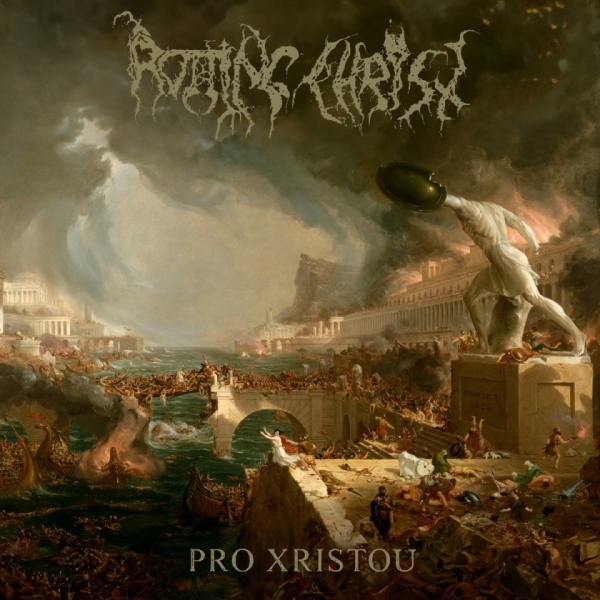Rotting Christ - Pro Xristou
• album review •
 BY CRIMSON ROSE
MAY 28, 2024
BY CRIMSON ROSE
MAY 28, 2024
 Rating: 6 / 10
Release Date: May 24, 2024
Rating: 6 / 10
Release Date: May 24, 2024
01. Pro Xristou (Προ Χριστού) 01:29
02. The Apostate 05:01
03. Like Father, Like Son 04:35
04. The Sixth Day 03:56
05. La lettera del Diavolo 04:01
06. The Farewell 06:15
07. Pix Lax Dax 04:33
08. Pretty World, Pretty Dies 04:51
09. ᛦᚵᛑᚱᛆᛋᛁᛚ 05:04
10. Saoirse 06:17
Rotting Christ, the name alone evokes an image of unfiltered death and blasphemy, a fitting description for the band that has been a cornerstone of the black metal scene since their debut in 1993. Over 31 years and 14 full-length albums later, Sakis and Themis Tolis return with their fifteenth album, Pro Xristou. While the band has certainly evolved from their ferocious early days, incorporating more majestic melodies and gothic elements, Pro Xristou unfortunately falls into a pattern of monotony that feels more complacent than innovative.
The album starts promisingly with the title track and "The Apostate," featuring mid-paced chugging riffs, enveloping chants, and the band's signature spoken word sections. However, by the time "Like Father, Like Son" and "The Sixth Day" roll around, the repetition becomes evident. The tracks, while individually competent, fail to offer much variety in tone, tempo, or timbre, resulting in a predictable listening experience. Even standout tracks like "La Lettera Del Diavolo" and "Yggdrasil" struggle to break free from the album’s overall sense of déjà vu.
This sense of repetition isn't new for Rotting Christ. The same issues that plagued their 2019 album, The Heretics, persist here. The formulaic approach—grandiose openings followed by mid-paced chugging, emotive solos, and recycled choruses—dominates the album, making it difficult to distinguish one track from another. Despite the technical proficiency and occasional moments of brilliance, Pro Xristou feels passionless and phoned in.
It’s puzzling why a band that once helped shape the Hellenic black metal sound continues to produce such low-energy efforts. Perhaps comfort has bred complacency within the Tolis brothers, whose long-standing partnership has remained the band's constant. This creative rut suggests a need for fresh perspectives or challenges to their artistic vision.
In summary, Pro Xristou is not a bad album; it’s well-performed and capable of moments that will get your head bopping and fists pumping. However, its lack of innovation and repetitive structure make it a less compelling entry in Rotting Christ’s storied discography. For a band that once thrived on pushing boundaries, it's disheartening to see them retread familiar ground. Perhaps it's time for the Tolis brothers to invite new influences and ideas into their creative process to reignite the passion that once defined their music.


